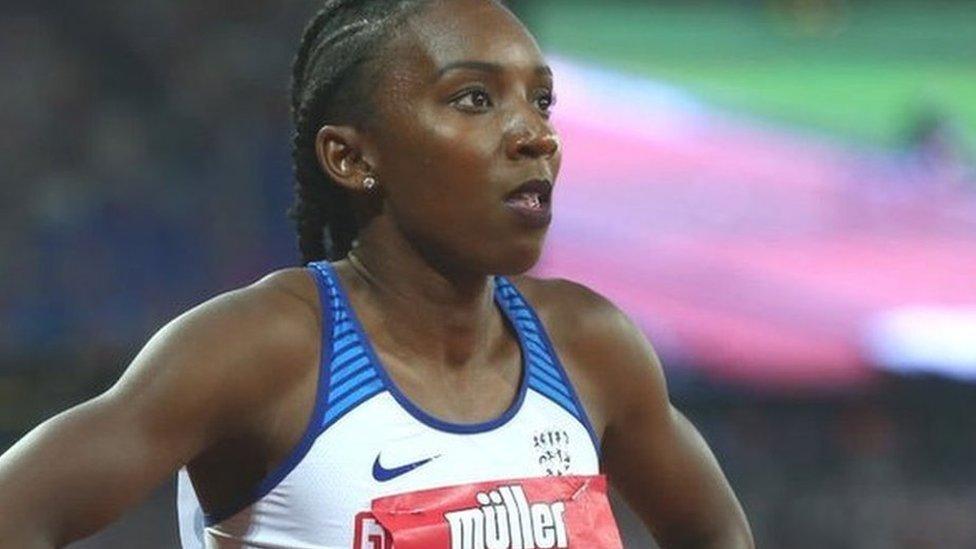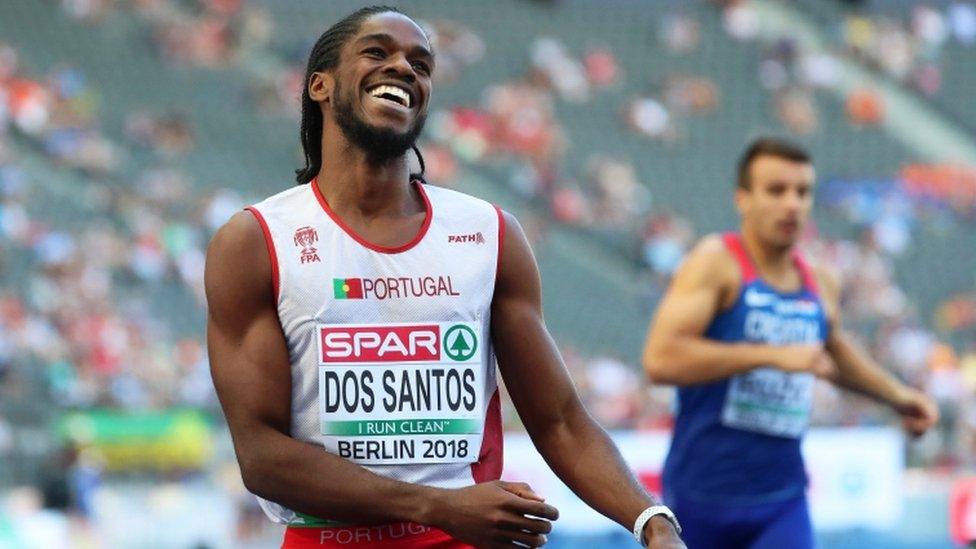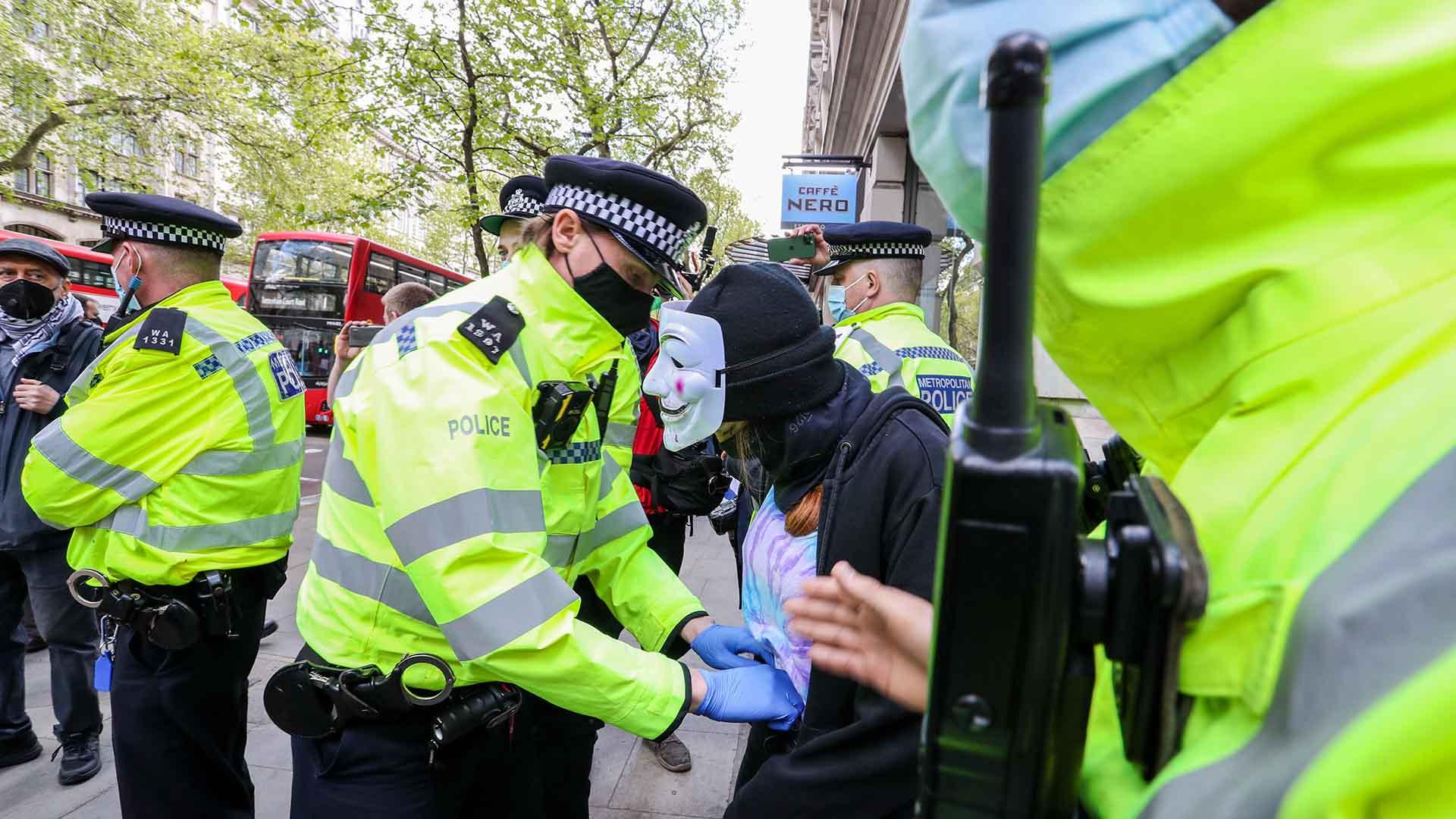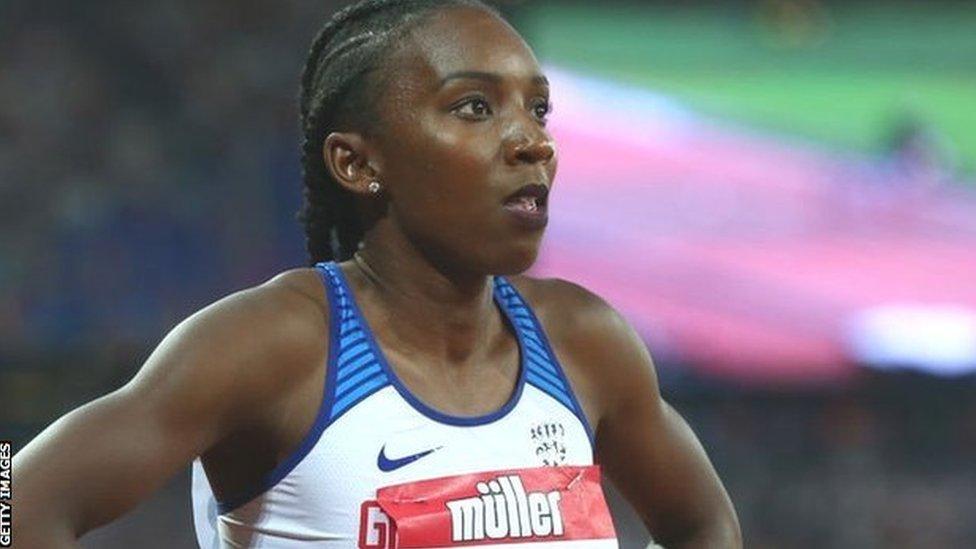Bianca Williams: Met apologises to sprinter over stop-and-search
- Published
Footage of the stop was shared widely on Twitter after being posted by former Olympic 100m champion Linford Christie, who questioned why the vehicle had been targeted
British sprinter Bianca Williams has received an apology from the Met Police after she and her partner were pulled over in their car in a stop-and-search.
Ms Williams's three-month-old son was also in the car on Saturday when it was stopped in Maida Vale.
Met Commissioner Dame Cressida Dick told a committee of MPs officers had visited Ms Williams to apologise for "distress" caused by the stop.
Ms Williams said police had apologised for the distress but not their actions.
Footage of the stop-and-search has been shared widely on social media.
Ms Williams believes officers racially profiled her and her partner Ricardo dos Santos, a Portuguese international 400m runner, because they are black and were driving a Mercedes.
They say police handcuffed them while their son was in the car.
Despite two reviews by the force's directorate of professional standards, Dame Cressida said the force had found no misconduct by its officers.
However, because of the public interest in the case, the Met has referred itself to the Independent Office for Police Conduct (IOPC).

Bianca Williams won European and Commonwealth gold in the 4x100m relay in 2018
Earlier, Dame Cressida told the Home Affairs Select Committee: "We apologised yesterday to Ms Williams and I apologise again for the distress this stop clearly caused her.
"I think all of us watching could empathise with somebody who is stopped in a vehicle, who has a young child in the back, who does not probably know what exactly is going on, and is subsequently found, together with her partner, not to be carrying anything illicit."
Dame Cressida said she has asked a senior officer to review the Met's handcuffing practices to make sure it hasn't become a "default", and has set up an "oversight group" looking at the use of force.
"Every time we see a video that is of concern we review them, we see if there are any lessons to be learned," she told MPs.
In a statement on Instagram, external, Ms Williams wrote that the couple welcomed the referral of the incident to the IOPC.
She said: "An independent investigation is now necessary, as the Metropolitan Police have proved that they cannot be trusted to investigate a complaint themselves, having already publicly stated that there has been 'no misconduct'."
"We have now received an apology for the distress the incident caused us, but significantly, not for the wholly unjustified actons (sic) that officers took against our family.
"We are now contacting the IOPC through our lawyers and will assist fully with their investigation, which we hope will be rigorous," Ms Williams added.
IOPC Regional Director Sal Naseem said the IOPC would look at whether the use of stop and search was appropriate and proportionate in line with approved police policies, adding: "We will also investigate if racial profiling or discrimination played a part in the incident."

How often are people handcuffed?
By BBC Reality Check
In 2018-19, police officers in England and Wales used handcuffs just over 300,000 times.
Around 16% of those people cuffed were black.
This means that, when we look at people who were handcuffed relative to their population in the 2011 Census, black people were roughly six times more likely to be handcuffed than white people.
Not all people who get arrested are handcuffed and not all handcuffed people get arrested.
However, the ratio of handcuffing to arrests shows a great discrepancy between black and white people:
• In 2018-19, 452,000 white people were arrested and 210,000 were handcuffed
• Over the same period, 60,000 black people were arrested and 49,000 were handcuffed

Ch Supt Karen Findlay, who is in charge of the Territorial Support Group which conducted the stop, and local area commander Helen Harper, also informed Ms Williams about the IOPC referral and the next steps in the process.
But Assistant Commissioner Helen Ball told the committee there had been "good grounds" for the car to be stopped and at that point the officers involved did not know who was in it.

Mr Dos Santos and Ms Williams say police handcuffed them while their son was in the car
Nothing was found in the search, which the Met said was carried out by officers patrolling the Maida Vale area in response to an increase in violence involving weapons.
The force also said the vehicle was seen driving suspiciously, including on the wrong side of the road, and that the driver sped off when asked to stop.
But this account was rejected by Ms Williams, who has said she is considering legal action against the Met.
"I feel very hurt by their actions, and to witness my partner being taken away and for me to be taken away from my son, my heart hurts," she said this week.


The Bianca Williams incident has intensified the focus on the use of force by police in the UK, particularly by the Metropolitan Police.
Figures published by the Home Affairs Committee suggest handcuff use in the Met has quadrupled in three years, from 5,559 instances in April and May 2017 to 25,251 over the same period this year.
The statistics indicate the rise has been driven by a surge in handcuffing of "compliant" individuals.
Scotland Yard says comparisons with earlier years aren't possible because the data are unreliable, but Dame Cressida Dick's decision to set up a review shows she's seeking reassurance that handcuffs haven't become the norm.
The commissioner says she's also monitoring stop-and-search figures "like a hawk" and acknowledged concern that in one month alone, May, 8,200 searches of black boys and men aged 15-24 were carried out - without any weapon, stolen goods or drugs being found.
- Published7 July 2020

- Published30 October 2023

- Published6 July 2020
